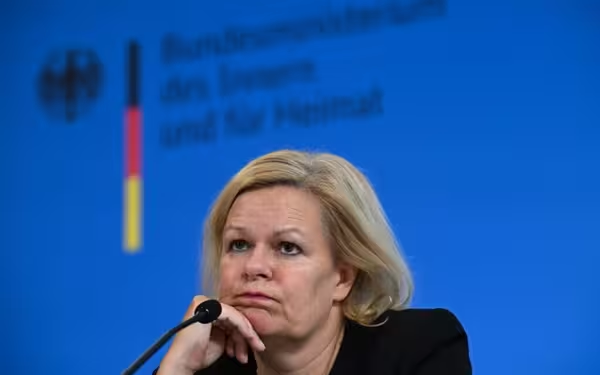Saturday, November 16, 2024 05:46 PM
EU Faces Crisis as Germany Tightens Borders Amid Migration Surge
- Germany imposes strict border controls starting next week.
- Mass migration leads to rising crime and political unrest.
- Other EU nations follow Germany's lead on border security.
 Image Credits: thefrontierpost
Image Credits: thefrontierpostGermany's new border controls signal a crisis in the EU as mass migration strains unity and security.
The European Union (EU) has long been a symbol of unity and cooperation among its member states, promoting the free movement of people across borders. However, recent developments indicate that this ideal is under severe strain. The German government has announced plans to impose strict new controls at its land borders, a move that signifies a significant shift in the EU's approach to migration. Starting next Monday, German police will begin checking passports at all crossing points, and some travelers may be denied entry. This decision comes in response to a surge in illegal immigration and growing social unrest within Germany, raising questions about the future of the EU's foundational principle of free movement.
Germany, once a beacon of hope for refugees and migrants, is now grappling with the consequences of its open-door policies. In 2015, then-Chancellor Angela Merkel welcomed over a million asylum seekers, asserting that Germany was capable of managing the influx. Following the Russian invasion of Ukraine, another million refugees were accepted. However, the continuous flow of migrants has led to a crisis characterized by a stagnant economy, rising crime rates, and widespread discontent among voters. The far-right political factions are gaining traction, reflecting the growing frustration among the populace.
While Germany is tightening its borders, other EU countries have also begun to reintroduce border controls, citing the need to address public order and internal security threats. Nations such as Austria, Slovenia, Italy, France, Denmark, and Sweden have taken similar steps, indicating a broader trend of disintegration within the Schengen Agreement, which allows for free travel among EU member states. The Schengen Borders Code stipulates that border controls should only be reinstated in exceptional circumstances, yet the reality is that these measures are becoming increasingly common.
The irony is palpable when considering Great Britain's position post-Brexit. Despite leaving the EU to regain control over its borders, the UK has not implemented stricter measures than it did in 2016. If Germany can take decisive action to manage its borders with nine neighboring countries, one might wonder why the UK cannot at least address its own immigration challenges more effectively.
As the EU grapples with the implications of mass migration, it is essential to reflect on the balance between humanitarian responsibilities and national security. The situation calls for a thoughtful approach that considers the needs of both migrants and host countries. The future of the EU may depend on its ability to adapt to these challenges while maintaining its core values of unity and cooperation. The question remains: how will the EU navigate this complex landscape, and what does it mean for the future of migration in Europe?













